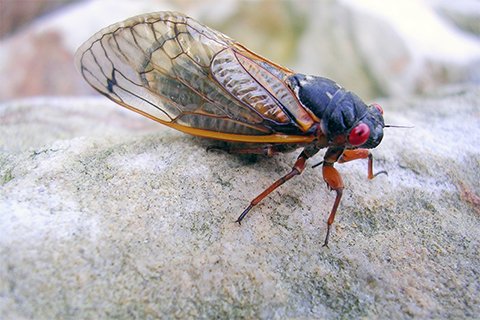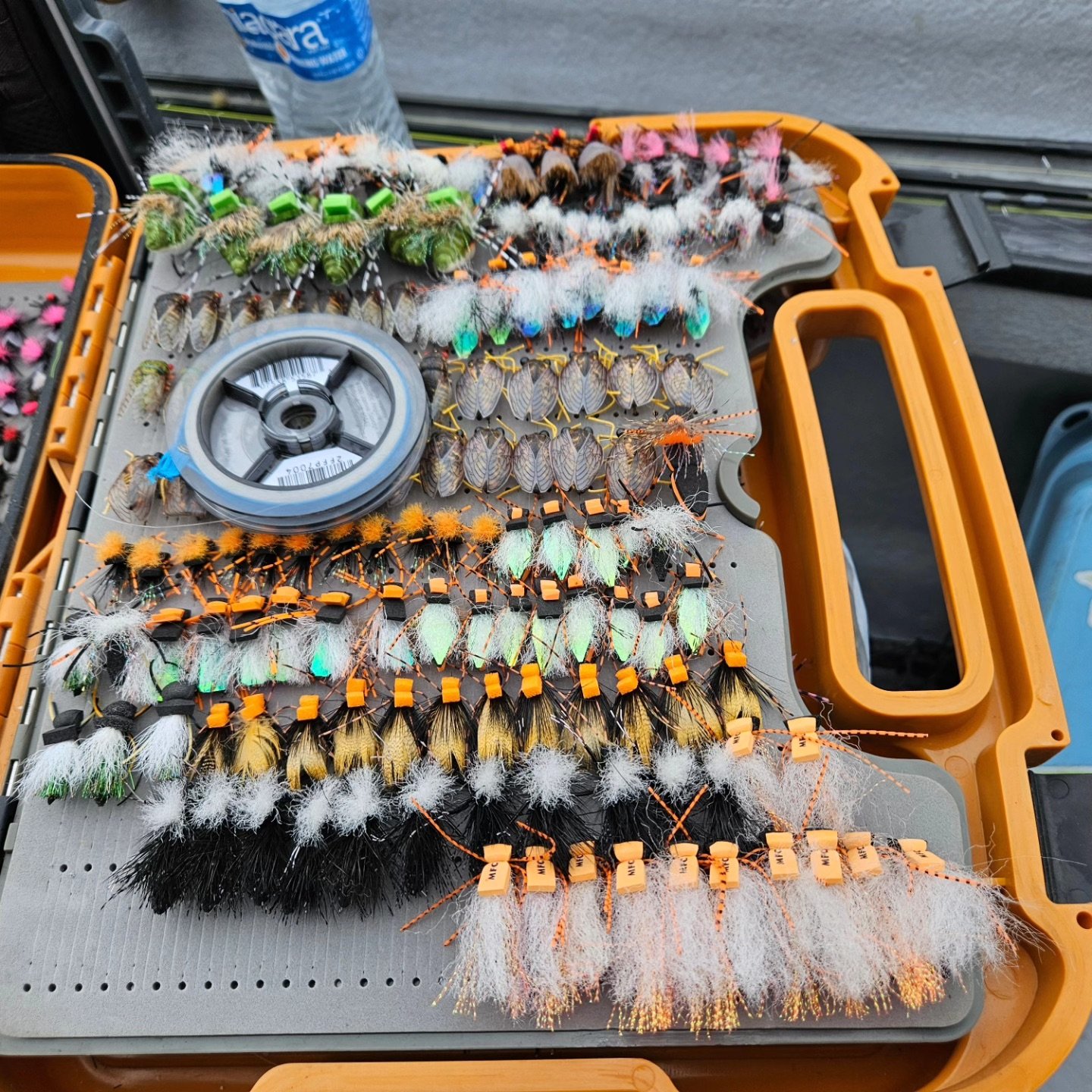Cicadapalooza
Many anglers, guides, and entomologists are popularizing the phrase Cicadapocalypse, it seems misleading. This is an emergence of billions of lifeforms and the amplified sounds of summer, this isn’t a doomsday scenario. Instead, I'm inclined to push a different word: Cicadapalooza. While Blink 182 won't be playing on the rivers of the southeast. There will be a non-stop party of music or noise (depending on your preference). That will bring excitement, photo ops, and a stellar reason to road trip with your fellow fly enthusiasts to a show that won't happen like this for a couple of centuries.
The Bugs
Cicadas are terrestrial insects that spend most of their life underground—emerging to the surface for just a few weeks only to breed. The life cycle of cicadas is unique in that a majority of their life, anywhere from 2 years in annual species to 17 years, is spent in a larval state where they feed on roots. Adults will emerge, breed, and then die in several weeks; the fertilized eggs will hatch before summer's end, and the larval cycle will begin again.
While some broods of cicadas are present every spring and summer, some broods make their emergence on a more spread-out timeline. Many "periodical" broods will emerge in swarm numbers every 13 or 17 years. This year, Brood XIII ( known as the Northern Illinois Brood) and Brood XIX ( Great Southern Brood) will emerge at the same time. Both these sizeable broods of cicadas will effectively join numbers, creating an emergence of nearly a trillion insects. This emergence will cover roughly 16 states in the central and southeastern United States. The last time these two broods emerged together was in 1803 when France sold the United States most of the land in which these cicadas were emerging in. There won't be another hatch with these two broods together until 2245.
While looking for mates, the cicadas generate the buzzing most often called a cicada scream, capable of reaching 100 decibels, not far off in volume from running a chainsaw. In swarm numbers, these cicada broods will congregate in the hundreds on trees and bushes to lay their eggs. When laying eggs, mature insects prune the bushes and trees, making ample space for their egg clutches and providing easy targets for hungry wildlife.
Hosted Trip
White River Arkansas Cicadapacolypse
3 Days / 4 Nights Fishing
Includes Lodging and Meals
Starting at $2,800/Angler
When
Cicadas begin their above-ground mating cycle when the soil temperatures climb above 64 degrees. This temperature delay means that cicadas began emerging on the southern edge of the range in mid-April. Most of the broods, however, will emerge in May and early June. The mating cycle only lasts for a few weeks, meaning the noise should be done in all but the most northern regions by July. The dead or dying cicadas will stick around for a few more weeks, making a prolonged feast for fish and wildlife.
Who
While looking at insects and listening to rock concert-level noise while being outside is cool, we at the Guide Book, and probably you reading it, are interested in fishing this spring and summer. Besides the noise, this mass arrival of cicadas creates a bumper crop of forage for fish. Even though they emerge with wings, adult cicadas are not strong fliers. Cicadas are likely to be blown into the waterways or fall off the branches as they expire; either way, anglers can expect to see fish aggressively patrolling and consuming these large terrestrials and their imitators this summer. To get some insider knowledge on the techniques and excitement around Cicadapalooza, we interviewed two guides from Guide Book.
The Carp Master
John Agricola
Carp South - Birmingham, AL
How long have you been flyfishing?
25 years I have been fishing for carp since 2013/2014, so nearly a decade
Are you planning to tie a cicada pattern, or are commercial presentations available?
I will be using a combination of foam and balsa cicada poppers this year.
What species are you planning on targeting primarily with this hatch? I'm taking a guess and saying carp, but I don't want to shoehorn you on it.
My favorite fish to target, in general, is carp, but cicadas will bring out my more opportunistic qualities. If I can find them on water, and there is no guarantee of this given human sprawl and development of land, then I will throw to any fish in the water, but I hope it is to flats carp. That said, I'll have to get lucky there.
Will you and your clients need to fish these cicada imitations differently than they would fish during this month?
I think you are asking if cicada flies will be fished differently than other flies fished during May/ June. The answer to this is yes. It is my assumption that a cicada fly fished on the surface as a topwater fly will require a different set. Instead of a strip set, as with most subsurface carp flies, you will be trout setting. This trout set is occasionally useful when the fish is close to the boat, or I have seen it work with hopper patterns out West on carp. The angle is all-important here.
Besides the noise, do you think there is a hatch similar to this? Are there grasshopper hatches or any other terrestrial that makes an impact like the cicadas?
Other hatches like tricos can change the orientation of carp from downward facing to upward looking. These are prolific in their own right at times, but I feel salmonflies are the only fly hatch on the commensurate protein scale of cicadas. This to my knowledge is a western phenomenon though.
The Mountain Man
Matthew Carter
Mt. Yonder - Greenville, SC
How long have you been fly fishing?
Lifelong angler. Picked up my first fly rod in 1987. Goofed with it on panfish. Got super serious about it 7 years ago. Haven't touched a spin rod or bait caster since.
Have you ever fished a cicada hatch before?
No. Technically, got bit by a micro-bluegill yesterday while scouting a fishery. He was no match for the size 4 hook. Haha
Are you planning on tying a cicada pattern, or are commercial presentations available?
I've tied a bunch of 'em. All ugly as crap but should fish just fine. I'm tying down to a size 8 and up to 2, thus far. I rarely follow patterns because I'm too ADD and have sausage fingers. I will be tying some cleaner stuff like Dave's 17-year-itch for more finicky fish the further we get along. I'll buy some, too, because I'm still a sucker for sexy flies, and I'm short on time.
Will you and your clients need to fish these cicada imitations differently than they would fish during this month?
This is not a finesse game. Typically, my clients benefit from a cleaner presentation in our heavily pressured waters. We're also fishing some different waters than normal. If you don't have cicadas in your area and you don't care about em, the trout streams without bugs will have less pressure. Go whack 'em. If you want a chance at giant catfish, carp, stripers, gar, bass, panfish, and trout, then go find water where there are bugs and the appropriate fish.
I fish all day, but certainly, I'm more of a daybreak and sunset guy. (the cicada). Things are the opposite. Hottest part of the day is when the bugs will get active and they aren't the best fliers. That's when you'll find the fish eating. We'll be focusing on top water presentations, occasionally a sunken version but certainly no sinking lines.
Besides the noise, do you think there is a hatch similar to this? Are there grasshopper hatches or any other terrestrial that makes an impact like the cicadas?
This is most akin to fishing hoppers though the numbers are different. I'm sure out west the Mormon crickets and all those sorts of plague-y bugs are similar but I've never personally seen anything like this in all my years of angling. I've driven thru cicada emergences but have somehow just never been in the thick of things. The wildlife are acting weird, the sound is non-stop and the action should be hot. I'm more than stoked.
I'd like to specifically say that any knowledge I possess comes directly from conversations with Dave Zielinksi and his book "Cicada Madness." Dave's 17-year itch is his bug and the recipe can be found in the book. Great dude. Looking forward to a lifelong love affair with these emergences.
Two guides are located in the hot zone of Cicadapalooza, each with valuable insight and excellent perspectives on what this once-in-a-lifetime hatch will mean for fly fishing this spring and summer. Fish species, from carp to trout, in waters from Alabama to Wisconsin will be gulping down cicadas this year. Whether they fall to a balsa popper on John Agricola's line or Matthew Carter's "ugly imitator", every catch will be one to remember. If you are looking to create your own Cicadapalooza/ Cicadapocalypse story, find our trusted fishing guides here. Oh, and maybe bring some earplugs.







